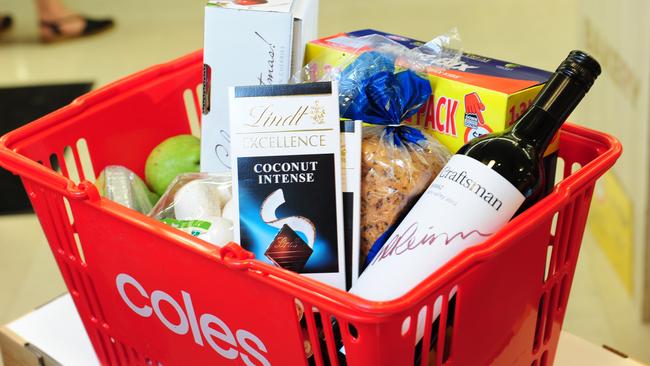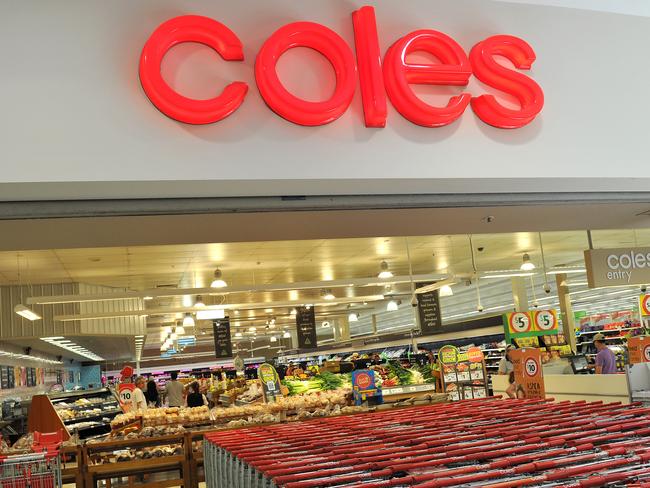Coles leaves door open to price war
IT’S JUST like an ordinary Coles supermarket, except there are no customers to be found. But the radical idea could be the retailer’s saving grace.

SUPERMARKET giant Coles is trialling its first-ever stand-alone online store — dubbed a “dark store — as it tests the waters ahead of a potential disruption by overseas players such as Amazon Fresh.
The global online shopping giant recently announced a launch into the UK market, but has not yet revealed any plans to head down under.
But Coles is not taking any chances, with plans to test its first online-only store in Melbourne. Instead of cashiers and customers, the dark store will have a dedicated team picking stock to fill online orders.
Speaking at the Wesfarmers annual strategy briefing on Wednesday, Coles managing director John Durkan said Coles was well aware of the impending threat of overseas rivals.
“We don’t want to leave you with the impression that we’re being tardy. [But] we are a completely different market to the rest of the world. Outside of relatively small hubs, it’s very convenient to do your shopping in Australia,” he said.
“The density of population and geography allows most people to get to stores very quickly, park, do their shopping and leave. I was shopping at East Village last night, we’ve got 800 car parks below the apartment blocks towards the airport.
“That is huge for what is effectively an inner-city store with a huge population. It’s much more efficient for us and our customers to do our shopping in that way.”
The online store, which he said was “profitable, but not ragingly profitable”, currently serves a 5km radius in inner-city Melbourne.
“The only way I can see it working is in high-density locations where you get the volume from a small-scale picking operation, not interrupting either our customers or team members,” he said.
“The Melbourne store serves the CBD and high-density apartment living, but doesn’t have a huge reach in terms of geography.”
He said there could be two more online stores in the next two or three years.
“There just isn’t the population density at the moment in Melbourne or Sydney, [although] we could probably put one in Sydney right now. But we are thinking about this intensively, absolutely.”

On the competition, Mr Durkan said Coles would do whatever it takes to suck oxygen from Woolworths, even if that means getting involved in a damaging price war.
Mr Durkan stressed that the key focus was on seeing basket prices drop relative to Coles’ internal measures, but acknowledged that “we don’t work in a vacuum”.
Year-to-date Coles has dropped food and liquor prices by 1.4 per cent, with more than 2600 products now added to its Every Day value pricing.
Price cuts across a range of items helped lift Coles’ comparable food and liquor sales by 4.9 per cent during the third quarter of the current financial year, while rival Woolworths’ food and liquor sales declined 0.9 per cent.
Mr Durkan said on some heavily discounted “hero products” such as Kleenex tissues, Colgate toothpaste and Sunrice, marketing and in-store promotions had boosted sales growth by between 50 to 80 per cent.
“Our aim is to lower the basket price week in week out for our customers. Our primary measurement is our own basket, week-on-week and year-on-year,” he said.
“Versus our major competitor we’ve seen a variety of moves throughout the year, ups and downs, but we’re still cheaper and plan to continue to do that.
“We’ll look at the market we’re in at that point in time. Of course we’ll always remain competitive. If we need to [invest more in lowering prices] that’s exactly what we’ll do.
“We’re customer-driven and that means you do exactly what you say you do, so we will take an investment strategy based on what we see in the market.”
It comes after investment bank UBS warned that the risk of a damaging price war within the next two years in which “all listed retailers lose” was growing, with Woolworths the most likely to initiate.
Mr Durkan said Coles would drive higher sales through ongoing investment in price deflation, funded by internal efficiencies, and growth in fresh food.
“Australia is different to a lot of other markets around the world,” he said. “There is a much bigger independent trade here than anywhere else in the world, and lower market shares for the major players particularly in fresh food, so there is an opportunity.
“I think there is a lot of headroom in Australia. We’ve still got a whole load of customers one, that don’t shop with us and two, that still don’t buy all their fresh food with us.”
He said recent price cuts on fresh food items such as bananas had been driven by “unprecedented” growing conditions, but long-term fresh food deflation was being driven by longer contracts with a smaller number of larger suppliers, such as South Australian tomato grower Sundrop Farms.
Fresh food in particular was identified as a key differentiator against hard discounters like Aldi, which Mr Durkan conceded was around 10-15 per cent cheaper, consistent with the UK.
“We’re comfortable with where we are on price versus hard discounters,” he said. “You have to remember we’re a full-service retailer, we invest in customer service, in-store bakeries, serve-over meat, fresh produce training, hot chickens.
“There will always be a proportion of customers who need to shop at hard discounters, it’s a fact of life. But we’re confident we’re in the right place in our pricing strategy and dynamic.”
He also touched on the controversy around $1-a-litre milk, arguing local farmers could not be immune from the global commodity price crash and that Coles’ direct relationships with farmer co-ops Murray Goulburn and Norco were critical.
“Dollar milk is really important because customers on a budget can only afford a $150 shop a week. [That’s] roughly two million households in Australia, therefore $1 milk is really critical,” he said.
“We moved to direct relationships with farmers and suppliers for that very reason that we can be open and transparent about prices, and both [co-ops] have said their businesses are better off for having that relationship with us.
“With the commodity price of milk collapsing, Australia can’t be immune. The two co-ops would say having the business relationship with Coles that turns milk into a value-added product is beneficial.”
Dismissing small-format stores as a “buzzword”, Mr Durkan said Coles did “not have a burning ambition to open tiny little stores on high streets”.
“They’re always more costly to serve, generally they’re higher priced, and you need hundreds of them to have a sizeable EBIT return to your business — so it’s not a high priority,” he said. “If we can build them out of our Coles Express business we will do so.”
— with AAP




